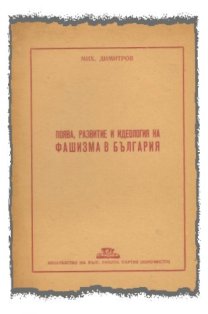
ORIGINS, DEVELOPMENT AND IDEOLOGY OF FASCISM IN BULGARIA
Author: Mihail Dimitrov

Nationalist Environment of Bulgarian Politics
Like in most European societies, nationalist movements and organizations were well represented on the Bulgarian political scene between the two world wars. There were good reasons for their variety and changing influence. The country lost large territories in the wake of the Berlin Congress (1878), the Second Balkan War (Treaty of Bucharest, 1913) and the First World War (Treaty of Neuilly, 1919). The reparations after the First World Wars were heavy. Nevertheless, petit-bourgeois democratic parties and internationalist leftists became more influential after the WWI than the nationalist and revanchist parties and movements. Fascist-like organizations could only take over the power after COUP d’états in 1923 and 1934. The king (tsar) Boris III who ruled the country in an authoritarian way till 1943 was an ally of Nazi Germany during the Second World War. He officially tolerated the fascist organizations of “National Legions”, “Ratnik” and “Brannik”. But it was a public secret that he had personal preferences to the British model of political institutions and government. Besides the influence of non-fascist ideologies and political organizations, this was one of the reasons why no large and politically relevant radical-nationalist and pro-fascist movements or parties could be established in Bulgaria. Prof. Alexander Tsankov’s efforts to develop the parties “Naroden Sgovor” [People’s Alliance] and “Democraticheski Sgovor” [Democratic Alliance] as powerful pro-fascist parties failed. The major reason was the ability of the monarchy to keep the political left in the country under control without relying on radical right-wing organizations. On its part, Boris III tried to implement active nationalist policies against the neighboring countries mostly by diplomatic activities and not by mobilization of radical domestic forces. Domestic policies of ethnic suppression and ethnic assimilation were regularly carried out by Bulgarian governments and were supported by the monarchy.
Since the participation of Bulgaria in the Second World War under the banner of monarchy-led nationalism ended once more with national catastrophe, the revanchist and aggressive nationalism was largely discredited in the public mind. No influential right-wing nationalist cultural and political tradition could be continued after 1944. Even the personal continuation of right-wing ideas and policies became impossible since the functionaries of pro-fascist organizations were severely persecuted and many of them physically eliminated after 1944. Others lost the connection to the processes in Bulgaria due to decades spent in emigration.
***
Addendum: There are two things evident from the circulation abstracts cited above — 1) That the question "Was there fascism in Bulgaria?" is still poignant in contemporary transition-to-democracy Bulgaria. The periodization of Bulgarian historiography in terms of scholarly efforts to study fascism also seems a bit far fetched. For instance, between the first post-war research work /i.e., the book from M. Dimitrov "Origins, Development and Ideology of Fascism in Bulgaria" (1947)/ and subsequent social-philosophy monographs by the Institute of Sociology, BAS, had elapsed 35 years of relative silence and absenteeism. The investigations by "dissident" intellectuals Z. Zhelev, M. Semkov, etc. in the 1980s were rather on the tail of a scholarly effort than being its head. Yet the backwardness of those highly debated "etudes on fascism" were glorified incessantly by the new democrats, who were less concerned with studying fascism than being categorical denunciators of the Bulgarian Communist Party's past, present, and future.
On the second abstract — 2) Whether there was a "nationalist environment of Bulgarian politics" in the interwar period. There appeared plenty of monographs written by research associates of the Institute for History of Bulgarian Communist Party, BAS, that lengthily explored the State Archive and various foreign historical depositaries. While the efforts of historians such as K. Kosev, Y. Mitev, I. Dimitrov, V. Tosheva and a hoard of other adversaries shouldn't be deprecated there remains still open the question "Why there are so many missing titles, both in bulgarian and foreign languages, that are not included in the literature review?" Those outliers were purely nationalistic literature /i.e., written by Bulgarian apologists such as A. Tsankov, L. Vladikin, etc. + foreign works translated in Bulgarian/ that give theoretical and avant-guard research on Fascism as ideology. Instead the gaps in theory were covered by Marxist-Leninist idiomatics.
Given the parsimony of our project, we couldn't spent much time on detailed discussion in the nature of Nationalism and Racism as perceived by the international community. The protocols of the Nuremberg Trial are good starting point for those interested in phenomenological research and politics. Here it is our privilege to present the first post-war Bulgarian scholar that wrote a critical study on Fascism in Bulgaria. Totally forgotten by totalitarian propaganda, provost Mihail Dimitrov is known predominantly for his psychographic etudes on revolutionaries Hristo Botev and Vasil Levski. He also had written critical works on the ideology of Nietzsche and on Freud's Psychoanalysis. It is interesting to mention, also, the specific pre-war occupation of this talented intellectual — viz., research in the "Psychology of Spontaneous Eidetism" which is the science of color and form recognition. According M. Dimitrov, this branch of psychology is more important than the study of Ego and Libido as propagators of human development. It is a discord of Psychoanalysis at its rudimentary phase, ditto.
Pictures 1 & 2: Sample illustration on the text above.
|
(i). Prof. Aleksander Tsankov and the first pro-fascist Bulgarian government from 9 June 1923. The white table-cloth with royal insignia at center stage is old symbol of free-masonry. It was last reported to be in possession of regent Bogdan Filov.
|
|
(ii). King Boris III and his bust-monument. Such landmarks of leadership and glory were often fashioned in interwar monarch-fascist Bulgaria.
|
Copyright © 2011 by the author.